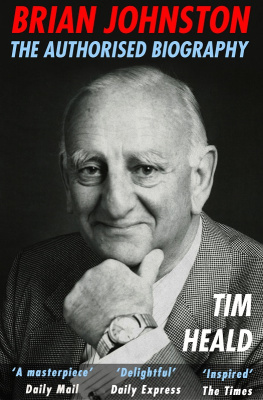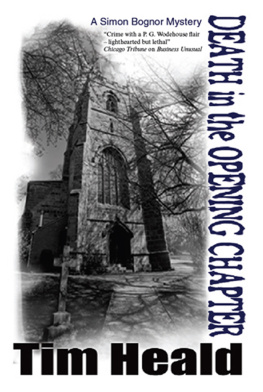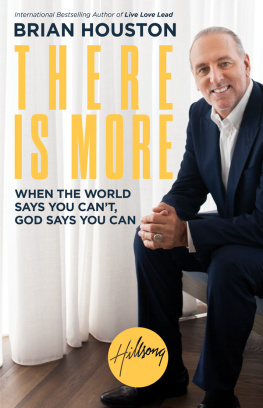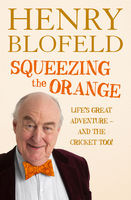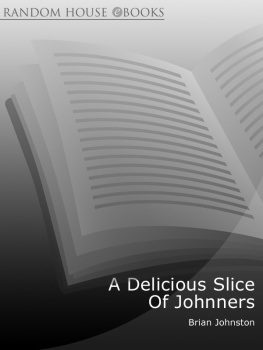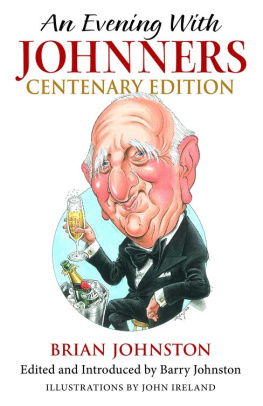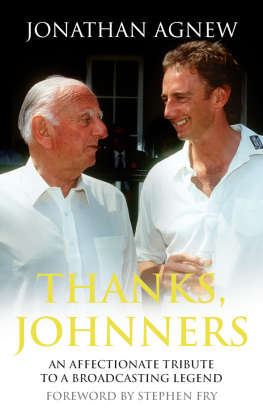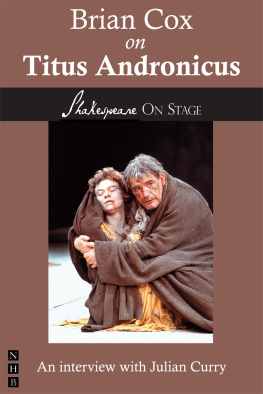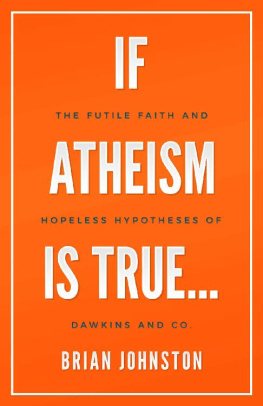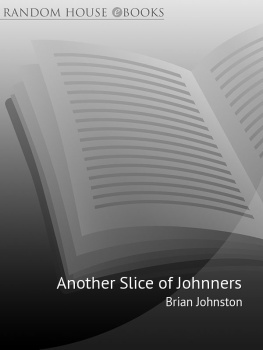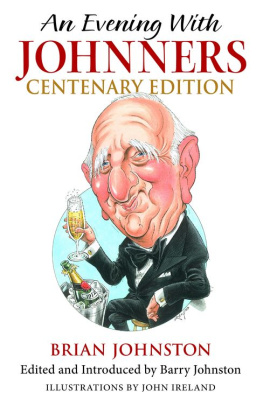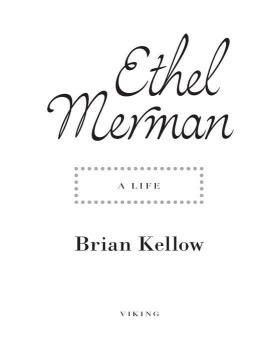Authors Note
I first met Brian Johnston at Headingley during a Test match against Australia just a few years before he died. I had been asked to write a magazine piece about Test Match Special, and Brian had agreed to be interviewed in the commentary box.
When we had finished our interview we went off to lunch, walking along the back of the Headingley ground which doubles up as the home of the Leeds rugby league football club. At one point Brian half tripped on a bench and said, quite angrily, Oh, bugger! I remember the sense of relief. It was not a word he would ever have used on air or in public. For a moment that veneer of self-control had slipped. I thought to myself, Oh good, hes real.
My next encounter was in 1989, when I was editing an anthology about Lords Cricket Ground for MCC at the behest of E.W. Swanton. Although the fee was derisory Brian was happy to write about his favourite ground and contributed a typically charming, anecdotal piece. For forty-two years he had lived within walking distance of the ground two minutes from the Cavendish Avenue house, eight and a half from Hamilton Terrace and sixteen on a good day from Boundary Road. That summer he commentated on his fifty-second Lords Test which must, as he remarked, be why he thought of the place as My Lords.
Most of our communication was by post. His came in the form of blue postcards covered in spidery blue writing.
Thereafter I bumped into him from time to time at cricket grounds. We chatted at Wormsley on the opening day of John Paul Gettys magnificent country house ground, and we said an affable hello behind the pavilion at Lords. He was always smiling, polite but faintly remote. In no way could I claim friendship. When he died I shared in the national mourning, but only as an acquaintance and admirer.
Then one day I came home and found a message scribbled in my younger sons handwriting. I was to ring someone called Pauline Johnston.
I duly telephoned and she explained that she was Brians widow and was looking for someone to write a book about him. Would I be interested?
When I met Pauline and Brians children it transpired that various other writers had been keen to write his life but there was a feeling within the family that there was more to Brian than cricket. Nearly all the other potential authors were very closely identified with the game and while it was obviously a passion of his he had other interests and loves. In later life Brian had become almost inextricably identified with Test Match Special and chocolate cake. I could see that they both loomed large but I sensed, as his family obviously felt, that any book about him should reflect his varied life as a whole.
Brian, of course, had written a good deal himself. In all, if you leave out a posthumous volume of jokes, he published fifteen books, all more or less autobiographical. Clearly these were an important source, especially Its Been a Lot of Fun, which he wrote immediately after is formal retirement from the BBC in the early 1970s. Brian disliked waste and when, some twenty years later, he wrote Someone Who Was Reflections on a life of Happiness and Fun, the material was rearranged into a different sequence alphabetical rather than chronological but otherwise remained substantially the same.
I had a slight problem with these books and in particular with Brians polished anecdotes. Roy Hudd, in his foreword to Brians final book of jokes described him, affectionately, as the wicked old poacher, and Brian made no bones about the fact that many of his jokes and routines had been picked up in the comedians equivalent of the Oxfam shop. And from time to time they were lightly moulded to fit in with his own experience.
So there is, in these books, an element of fantasy and myth-making. Does this matter? Not if one is simply interested in entertainment. If, on the other hand, you want to know what Brian Johnston was really like, then the well honed patter can be frustrating.
I have tried to sort out the facts from the fantasy, particularly where it really does affect his life story. Two events in particular seem to me to be significantly underplayed or distorted the death of his father when he was a small boy and his winning of the Military Cross in the Second World War. It is all part of his constant attempt to be sunny and smiling no matter what. His own version of his life makes it look as if it was all wonderful, rollicking fun, with never a bleak moment or an untoward reverse. I think that was what he wanted us to believe and perhaps what he believed himself. But Im not wholly convinced.
He kept diaries, but he was no Samuel Pepys or even Alan Clark. His diaries were like most peoples small dog-eared books which fitted into a jacket pocket and were used to log appointments. Lunches at Boodles, haircuts, Test matches, yes... but no revealing passages of introspection or reflection.
Nor was he a passionate letter-writer. He preferred postcards often naughty seaside ones which on the whole were no more easily decipherable than the diary entries. But most of his communication was oral. He was an assiduous telephonist in regular communication with a wide interconnected but carefully compartmentalised circle of friends.
And, of course, there are tape recordings of his famous one-man show and also of the various BBC broadcasts he made. These, though incomplete, go back to his very earliest days going somewhere in the late 1940s. They are nearly always interesting but obviously aimed at the general public so that, on the whole, they reveal little of the inner man but are mainly a confirmation of the personality known to millions.
There are other published sources. Many of his fellow cricket commentators have written memoirs and autobiographies and all include a number of Johnston anecdotes usually the same ones, though often told from a slightly different perspective. However the most valuable sources in this area have been various autobiographies by William Douglas-Home, possibly his greatest friend, but one who was often perceptive about Brian, albeit in the most affectionate way. Maddeningly, both William and Brian tell many of the same stories but frequently differ on several points. As they have both died and as there were often no other witnesses you simply have to pay your money and take your choice.
Another invaluable source is Summers Will Never Be the Same, the valedictory volume of tributes assembled by Christopher Martin-Jenkins and Pat Gibson. Not surprisingly it is weighted in favour of the later years and of cricket.
The most tantalising sources have been those who knew him best. Here too there are dangers. Memory is often faulty, particularly at a distance of seventy odd years and without much chance of written corroboration. I confess I did become mildly dismayed sometimes when, arriving at the home of one of Brians old school chums, one was greeted with infinite politeness, a glass of sherry and, Im afraid Im not going to be able to tell you anything you dont know already, or, Youll know all the stories by now, or, The thing about Brian is that what you saw was what you got. No hidden depths there... Ha! Ha! Ha!
His immediate family were the most revealing. Pauline and the children were generous with their time and disarmingly honest in their recollections. They obviously loved him very much, but this did not blind them to his eccentricities and foibles.
Partly because, despite some modern newspaper obituarists, it is still bad form to speak ill of the newly dead, many of those to whom I spoke tended to be quite bland. It is not part of my brief to suggest that Brian wasnt an extremely nice man, but even among those who might be expected not to enjoy those jokes or sympathise with his conservative and Conservative tendencies there was a palpable reluctance to saying anything remotely critical. It was as if one were inviting someone to make a rude remark about the Queen Mother.

